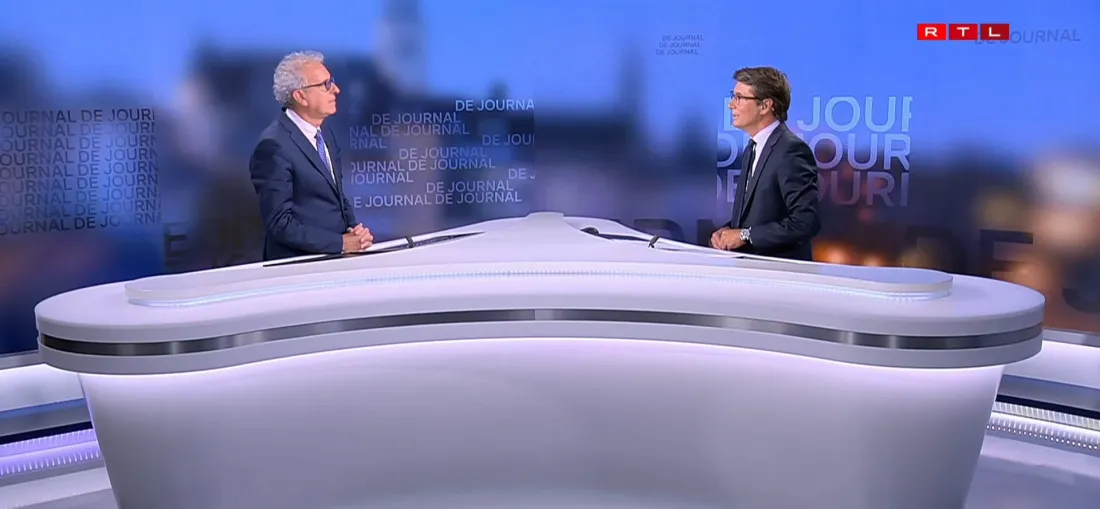Pierre Gramegna in interview with RTL TV (Luxembourg)

Interview with ESM Managing Director Pierre Gramegna
RTL TV (Luxembourg)
21 June 2024
Original language: Luxembourgish
Interviewer: Frank Goetz
RTL TV: From the studio, I now greet the Managing Director of the ESM, Mr Gramegna. Good evening.
Pierre Gramegna: Good evening.
You once said: if the ESM didn't exist, we would have to invent it quickly. If the ESM hadn't existed during the financial crisis, what would have happened?
At the beginning, when we had a financial crisis, the ESM didn't exist. When we noticed that some economies were weakened, that some countries had difficulties financing themselves in the markets because they had to pay very high interest rates, the first thought was to use the International Monetary Fund (IMF). It stepped in to help European countries, but this cost a lot of money, and it became too much, even for the IMF. Therefore, the ESM was created so the euro area could take care of its own destiny. Nobody had really thought about it. I think it worked extremely well. It was also in fact an illustration of what Mario Draghi said in 2012: we will defend the euro area, “whatever it takes”. "Whatever it takes" was a policy of the European Central Bank, which was applying an accommodating monetary policy, with low interest rates, and the ESM was associated with it. The creation of the ESM meant ensuring stability. It was created as a safety net for the euro area.
That was back then. This week, the European Commission asked seven EU countries, including five euro area countries, to take savings measures because they are partly heavily indebted. Often, the question whether the ESM is still needed is asked. Is that question thus not justified anymore?
It is important to ask that question. The ESM is like fire insurance. We guarantee the euro area. If you have fire insurance for your house and it burns, you are happy to have insurance. But if it doesn't burn, you don't cancel the insurance. So, the mere fact that we exist provides strong support for the credibility of the euro.
There is also the question about what this insurance can achieve. Among the countries [that are under the excessive deficit procedure], there is France, the second-largest economy in the euro area. There are also new elections, with large political uncertainty. France would be a large candidate to receive help from the ESM. Would that even be possible?
Theoretically, that would be possible, but we are not there at all. We have to look realistically at what happened. We had the European Parliament elections two weeks ago, and this always brings about certain turbulences, uncertainty in some countries. There have been interest rate movements in many countries. It is clear that the announcement of new elections in France has triggered more uncertainty than in other countries. Today, France pays 0.3% more compared to what it paid before the European parliamentary elections. This is not dramatic. But, of course, it also shows that investors are a bit wary.
Financial markets like everything, but not uncertainties.
That is correct, and that is why France pays that 0.3% more. But we must remain realistic. Yesterday, I attended the Eurogroup meeting where we discussed the situation. The market reactions have been orderly. France has a AA rating and has access to the markets. The situation should not be exaggerated.
Let’s remain realistic. The war in Ukraine is also a reality that worries many people. The military expenditures of euro area countries are increasing, and the question arises whether the ESM can help financially.
The ESM is there to help the euro area countries when there is a financial stability risk in a country, or when there is contagion risk. But we cannot help a country directly that is outside the euro area.
What would happen if one country experienced turbulences because of the war?
Yes, this is a case which was not thought of when the ESM was created, as it was created to address financial crises. But if certain countries need to ramp up their defence expenditures because of the war and therefore suffer serious financial difficulties, the ESM could, if a country sends in a request, help.
This would also apply to situations like the COVID pandemic?
Yes. The ESM helped during the COVID pandemic. On 9 April 2020 - I remember it well, as I was a finance minister back then - finance ministers agreed that the ESM would create a dedicated instrument to help countries during the pandemic. The instrument was never used but the ESM was already very reactive back then and we are also ready to act in such situations today.
You said the ESM is there to stabilise states. What about banks? How is the ESM set up to directly help banks in need?
The ESM, in most cases, in the countries that it has supported, helped states. But the ESM also helped banks indirectly. We have seven instruments at the ESM, and some are designed for the recapitalisation of banks.
In an amended Treaty that has been ratified by nearly all countries, it is foreseen that the ESM provides additional security to a fund that has been financed by the banks themselves, within the framework of the banking union. Europe has learned from the financial crisis, and banks are way more solid today. We saw this last year, when banks in the United States experienced turbulences, and this did not spill over to Europe. Because, today, the capital and liquidity of banks are higher.
There is still a small problem with the reform in Italy. Do you think that will work?
Yesterday, in our meeting at the ESM's headquarters, we had a very good discussion about the review of all our financial instruments. There was a willingness of all countries to optimise these instruments so we are ready for all cases.
The ESM has substantive means, notably also because it has an excellent worldwide reputation. It has a AAA rating. Do you need to work constantly to maintain this reputation?
The AAA is guaranteed because the Members States have promised €700 billion of capital, of which about €80 billion has been paid in. The ESM manages this €80 billion. With this capital structure, the ESM has a maximum lending capacity of €500 billion. The market likes the ESM, and we have no problem placing our AAA bonds. Last year, we issued €28 billion. We have a treaty that guarantees this.
The firefighter is well set up.
Yes, and we hope there won’t be any fire.
It is the best fireman that doesn’t need to go out. Pierre Gramegna, thank you very much for visiting us today.
It was a pleasure.
Author

Contacts


